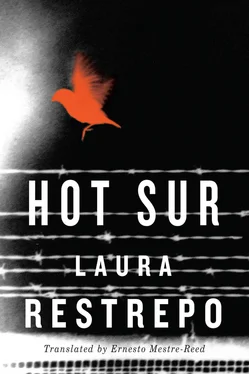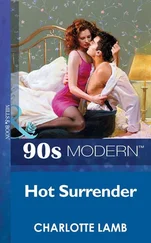Maybe it’s time to tell you why they put me in here. Although it won’t really be possible to explain it because I don’t really understand it myself. All I can tell you is that my chain of missteps in America began when I fell in love with a cop. Or when I didn’t fall in love with him enough, because I’m not going to lie to you, Mr. Rose, I can’t say I fell in love, not that kind of love you’d die for, that didn’t happen. I wonder if you are madly in love with that girl who teaches the deaf. I imagine you are from the way you talked about her. But with Americans you never know. You have this habit of saying things as if you were on camera, so it doesn’t matter what you say, as long as you say it with a smile and “have a nice day.” How I hate that “have a nice day.” They may not even know you or give a shit about your life, or you can drop dead in front of them, and they’ll still blurt out “have a nice day” with that fake smile.
Let’s put it like this, so when you write about it in your novel things are clear: my ruin was marrying Greg, the American ex-cop too many years older than me. He worked for the same company as me as a daytime security guard. Or maybe my mistake was loving him, because I shouldn’t have loved Greg, but I did. In his glory days he must have been a son of a bitch, one of those assholes that stomps on blacks and Latinos with their boots. Or maybe not, I was never quite sure. Anyhow, he had mellowed out by the time fate set him on my path, grown old and crusty, with a half-smile that was his white flag, making it clear he had surrendered long before. And besides, he was a widower, that type of widower with the air of an orphan begging for a good woman to take care of him.
He had the stuff of a bull, but came around the corner seeming like a tired steer. A nice fellow, believe me, with a beer belly and shiny black shoes. But what really attracted me to him, I’ll tell you, although it sounds bad, was that he was tall, white, blond, and English speaking. Well, blond at some point, but by the time I met him he was bald. I was attracted to the fact that he wore his blue-and-white Colorado Rockies T-shirt when he sat down to eat, that he put half a bottle of ketchup on everything, and that he thought if you were Colombian, you surely must know a friend of his who lived in Buenos Aires. Someone like that was a dream come true, just what I had been looking for since the time I ate Milky Ways dreaming about America. I’d had various US Latino boyfriends, one Honduran and another Peruvian. But this would be the first time in all those years that a gringo-gringo expressed serious interest in me, as Bolivia would say, or interests other than sucky-fucky ones. Think about it, Mr. Rose, what it meant for a poor Latina to finally be part of life, not on the side of the violent minorities and the superpredators, but on the side of law and order and the special victims unit.
One Tuesday, I was on my way to the office with thirty-eight completed surveys when I needed forty. I was short two and that was a big drama, because they only paid us for completed jobs, a check for the paperwork for the entire job. Before going in, I was able to get in touch with a contact by phone, something that was prohibited because interviews had to be done in person and at the place of residence. But this time it was a real emergency; in general, I was very diligent about my work, none of these routine proceedings like the rest of the girls. Not me, I got into it in depth, pursuing the task with an investigative reporter’s brio, and asking more questions than I had to, for gossip’s sake, I think, because I got excited about the stories people told. I confess that sin, I like to stick my nose in other people’s business, find out what’s happening in the dormitories and kitchens, and well, now by necessity, inside the cells. Ever since I was a girl, I’ve always liked to butt into private conversations. I try to understand people’s dreams and miseries, and I am fascinated by real-life love stories and follow them as if they were telenovelas. The thing was that on that day I was able to get a survey done, but I still needed one more after that to get to forty. I went into a café to have breakfast, diagonally across from our office, very worried because for the first time I was going to turn in incomplete work. I ordered coffee and toast, and who do I see there but Greg, the security guard. The old man was standing there holding his coffee, feeding pieces of a ham-and-cheese sandwich to his dog Hero, a crippled little pet that was like a mascot for everyone in the company. Greg is my man, I told myself; he had been heaven sent. So I went up to him very demurely, questionnaire in hand. We had never talked before, that is, except for the “have a nice day” or to exchange a few words about how Hero was doing.
“I’ll buy another sandwich for Hero if you answer a few questions for me,” I proposed.
“About what?”
“About your cleaning habits, what do you think?”
“I don’t have many,” he said, but he responded to one question after the other honestly and sincerely. That’s how I first got to know him. He told me that before he joined the police force, he didn’t shower every day.
“How often? Weekly?”
“Let’s say a couple of times a week. But after joining the police I had to take a freezing shower every day.”
“Do you ever shower with hot water, or warm water?”
“That’s for sissies, for faggots,” he told me, and then admitted he didn’t know how to swim, that he had been terrified of water as a child because he grew up in Colorado, where his father worked at a barley farm owned by Coors.
“How is that pertinent?”
“Because there wasn’t a lot of water there, and whatever water there was they used to irrigate the barley fields.”
Moreover, his mother thought that water was dangerous because water opened the pores, and the open pores made the body vulnerable to infections and illnesses. She had only taken two full baths in her whole life and was proud of that, because for her cleanliness wasn’t about taking baths; on the contrary, she thought that if one wasn’t dirty, there was no reason to bathe, and that those who bathed a lot must be hiding some unspeakable sickness, because there was no other reason to explain such behavior.
“So according to your mother,” I told him, “the cleanest ones are the ones who wash the least.”
“Something like that.”
“You said your mother took two full-body baths. Do you remember the occasions?”
“The first on the day of her baptism when she was eleven years old. In her hometown, kids were baptized by plunging them into the Dunaj.”
“What’s the Dunaj?”
“The Dunaj, the Dunaj! Don’t you know it? The Dunaj is the biggest river on the planet.”
“The biggest river is the Amazon,” I said, sticking up for my own. “The Amazon that runs through where I come from. But no one thinks of plunging a girl into it to baptize her, because the piranhas would feast on her. But let’s leave it at that. Everyone has a right to think that their river is the biggest. But tell me about the second bath your blessed mother took.”
“I don’t know. I don’t think she ever told me, but there were only two, I’m sure of that, I heard her mention it a few times. She bathed my brothers and me body part by body part, feet and hands, face, ears, and neck, but she’d never put us in the bathtub, that was for lepers and the ill, according to her.”
“It’s okay, Greg,” I said, because I noticed distress in his voice, as if the memories weren’t pleasing.
It wasn’t long before I’d find out that the problem wasn’t just the mother. Greg as an adult also resisted bathing. My coworkers bragged how their husbands washed their things before doing it and then showered afterward. But that wasn’t going to be the case with me, neither before nor afterward. At that moment, of course, I couldn’t have fully known, so I just responded with the kind of consolation that entails offering someone who tells you a sad story about his life with an even sadder story about your own.
Читать дальше












